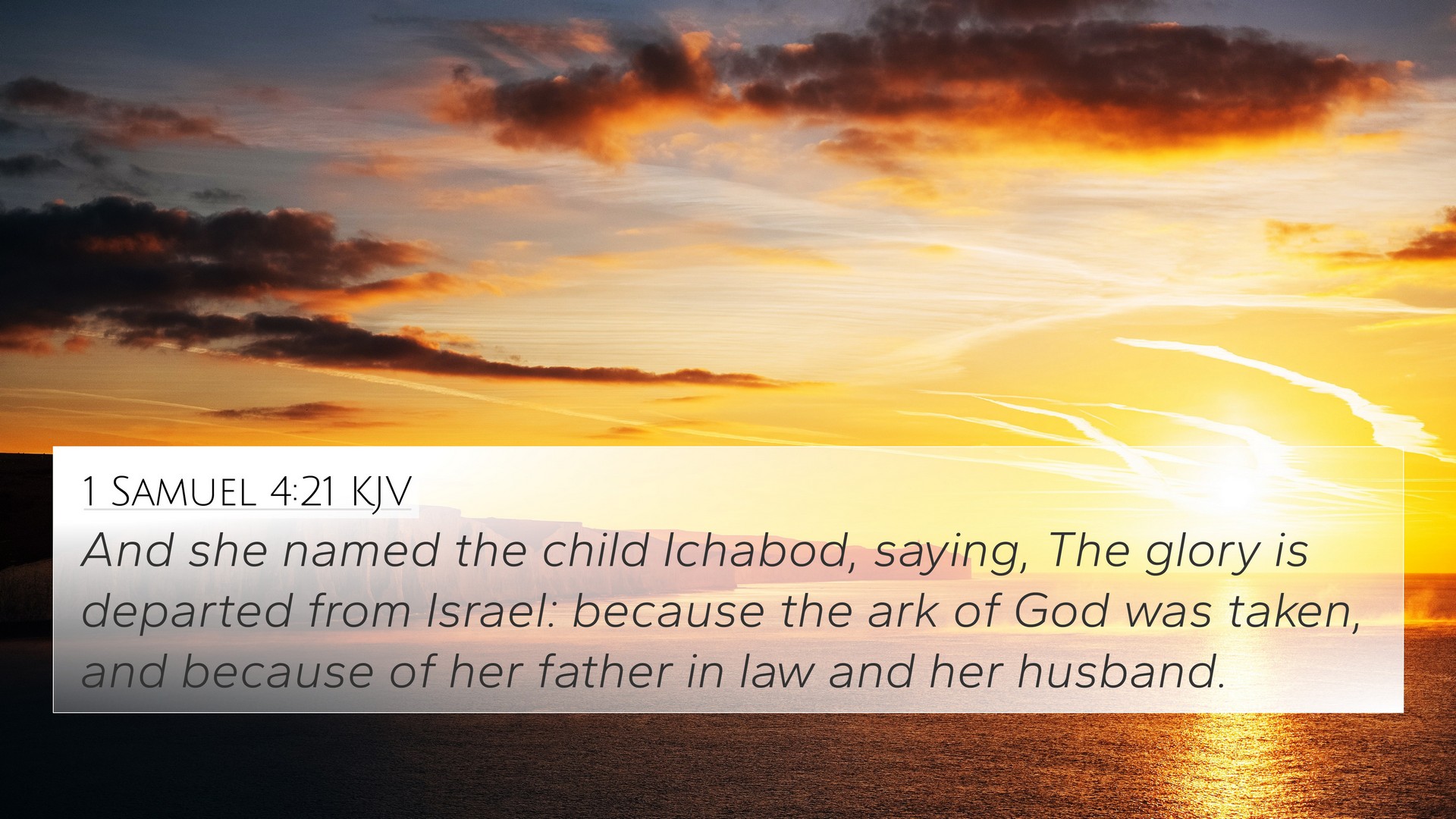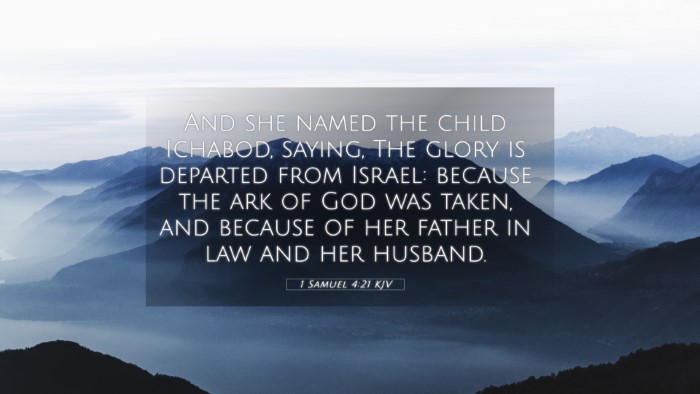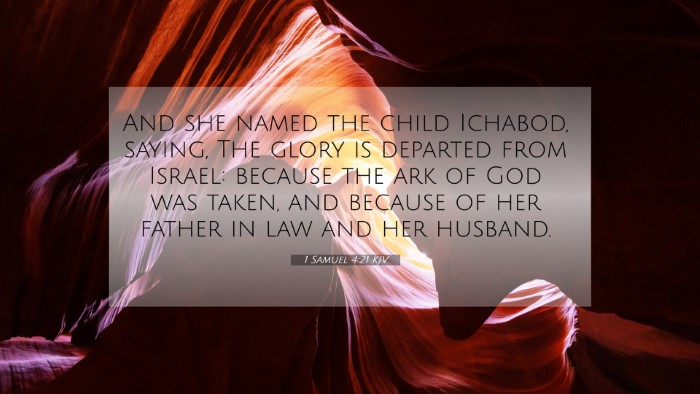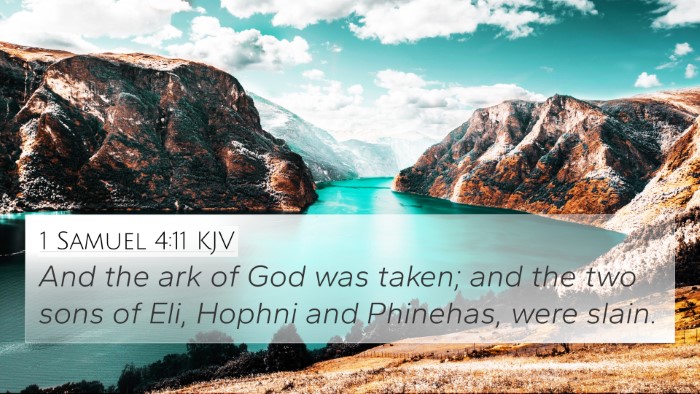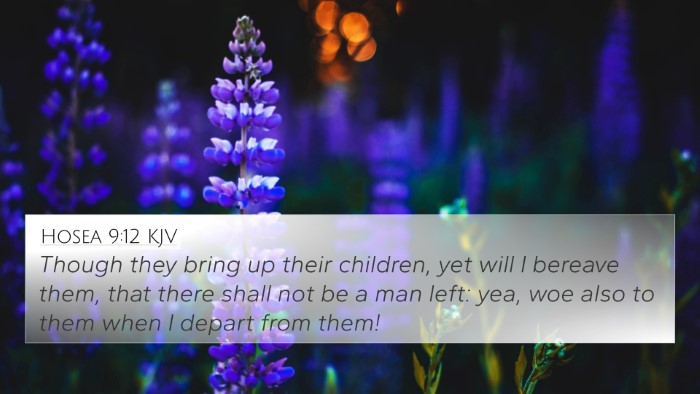Understanding 1 Samuel 4:21
1 Samuel 4:21 is a poignant moment in the narrative of Israel's history, revealing profound themes of loss, judgment, and the consequences of unfaithfulness to God. This verse states:
"And she named the child Ichabod, saying, 'The glory has departed from Israel!' for the ark of God had been captured, and for the father-in-law and her husband." (1 Samuel 4:21, ESV)
Meaning and Interpretation
This verse captures the emotional weight of the moment when the glory of the Lord departs from Israel, signified by the capture of the Ark of the Covenant. Through a mixture of scholarly tools for Bible cross-referencing, we will explore its meaning, thematic connections, and implications from several public domain commentaries.
Thematic Analysis
The commentary from Matthew Henry explores the significance of the name "Ichabod," meaning "no glory." Henry notes that this was a direct reference to God’s absence and indicates a critical turning point for Israel. The loss of the Ark represented not just the loss of a physical object but a much deeper spiritual crisis. He emphasizes that the glory of God’s presence is vital for Israel and any believer's spiritual vitality.
Albert Barnes contributes by pointing out that the capture of the Ark was the culmination of a series of ill-fated decisions made by the Israelites. Their reliance on the Ark as a talisman rather than a testament to their covenant relationship with God reflects a misunderstanding of divine presence. The consequence of their actions is articulated as a spiritual as well as a national calamity, tying back to broader themes of fidelity and divine retribution.
Adam Clarke elaborates further on the profound sense of despair conveyed in this verse, showing how the news would have affected not only Eli and his family but also the entire nation. Clarke highlights that the naming of Ichabod serves as a stark reminder for future generations about the consequences of their trust misplaced in physical symbols instead of in God himself.
Bible Verse Cross-References
In understanding 1 Samuel 4:21, we can identify several Bible verses that relate to this message of God's glory and presence, which enhances our comprehension of the text:
- Exodus 33:15: “If your presence does not go with us, do not bring us up from here.” - Highlights the essential nature of God's presence with His people.
- 1 Samuel 2:30: “For those who honor me I will honor, and those who despise me shall be lightly esteemed.” - Speaks to the consequences of dishonoring God.
- Ezekiel 10:18: “Then the glory of the Lord went out from the threshold of the house and stood over the cherubim.” - Illustrates the departure of God's glory in judgment.
- Psalm 78:60-61: “He forsook his dwelling at Shiloh, the tent where he dwelt among mankind, and delivered his power to captivity.” - Reflects on God removing His presence due to disobedience.
- Jeremiah 7:12-14: “Go now to my place that was in Shiloh, where I made my name dwell at first, and see what I did to it because of the evil of my people Israel.” - Indicates the same theme about the loss of God’s glory and its implications.
- Romans 3:23: “For all have sinned and fall short of the glory of God.” - A New Testament parallel relating human sinfulness to the absence of God’s glory.
- John 1:14: “And the Word became flesh and dwelt among us, and we have seen his glory, glory as of the only Son from the Father, full of grace and truth.” - Connects to the fulfillment of God's glory in Christ.
Inter-Biblical Dialogue
The loss of the Ark also opens a dialogue with New Testament texts that emphasize the restoration of God's presence through Christ. Acts 2:17-21 alludes to the outpouring of the Spirit, which is a new manner of God's presence with His people, signifying the restoration of "glory" in an even greater sense.
Conclusion
1 Samuel 4:21 invites us to reflect on the implications of divine glory in our lives. By studying this verse in conjunction with others, we learn not only about the historical context of Israel's defeat but also about the nature of our relationship with God. Through cross-referencing these biblical texts, we appreciate the discernible connections between both the Old and New Testaments, facilitating a more comprehensive understanding of God's unchanging nature and the importance of remaining faithful.
This kind of cross-referencing Bible study encourages a deeper exploration of scripture, revealing how verse parallels elucidate significant theological concepts.
